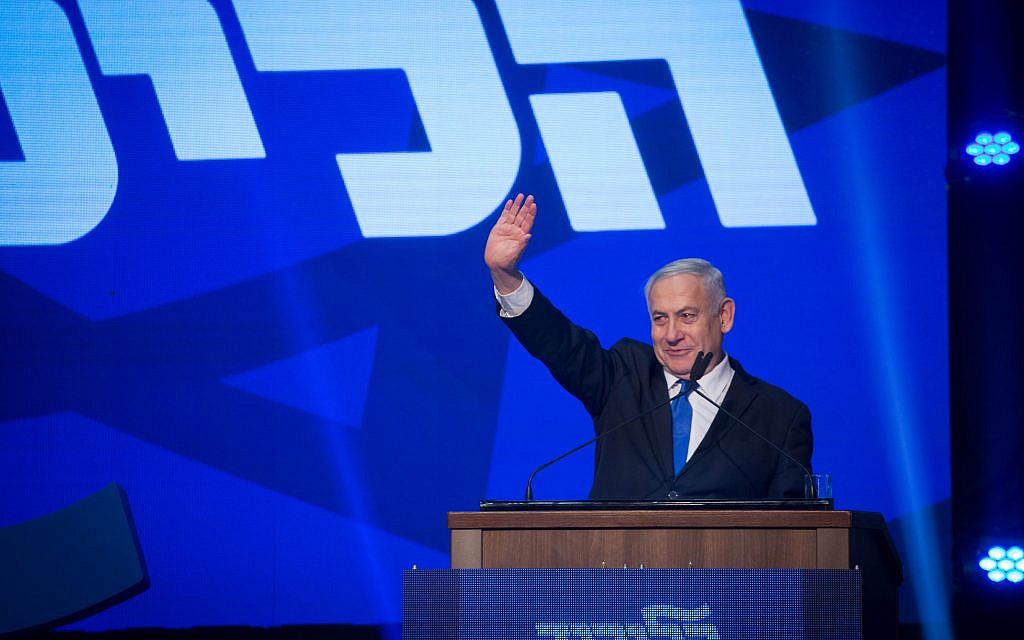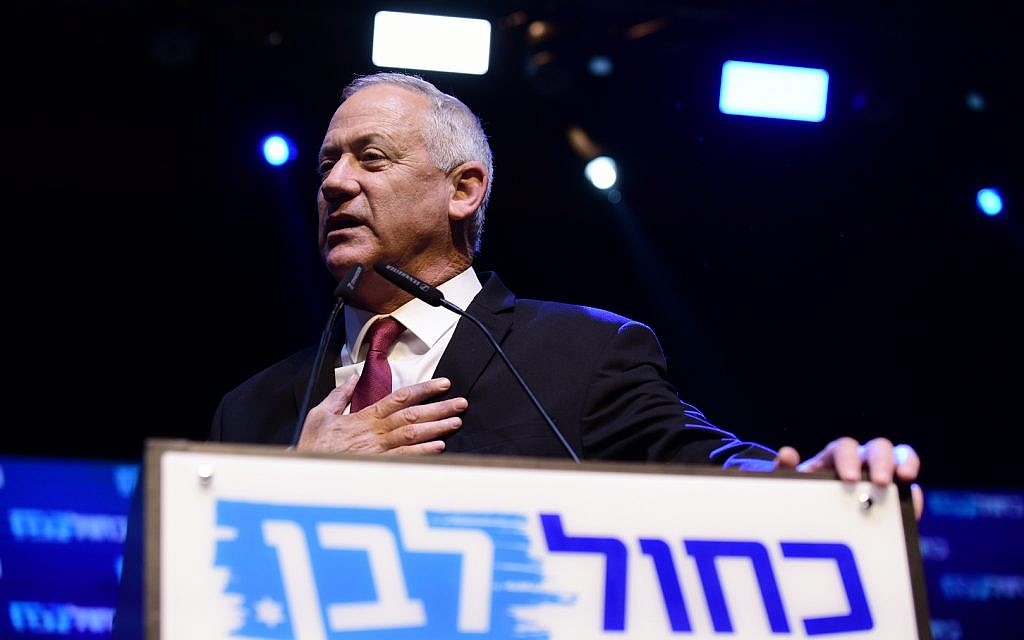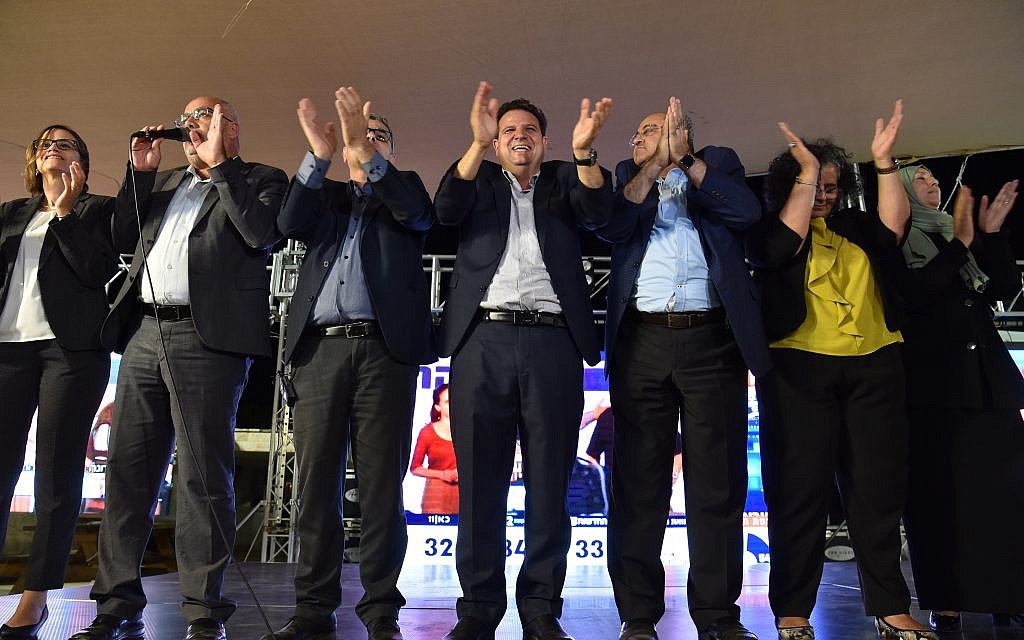Netanyahu runs out of rabbits to pull out his hat
As the dust settles on the second Israeli election of 2019, analysts reflect on the potential end of Bibi's decade in power and the new political landscape taking shape
 Prime Minister Benjamin Netanya speaks at the Likud headquarters on elections night in Tel Aviv, on September 18, 2019. Photo by: JINIPIX
Prime Minister Benjamin Netanya speaks at the Likud headquarters on elections night in Tel Aviv, on September 18, 2019. Photo by: JINIPIX Heads of the Joint List party reacts as the first results in the Israeli Knesset elections are announced, September 17, 2019. as the first exit polls are announced on television. - Israeli Prime Minister Benjamin Netanyahu and his main challenger Benny Gantz were neck-and-neck in the country's general election after polls closed, exit surveys showed. Three separate exit polls carried by Israeli television stations showed Netanyahu's right-wing Likud and Gantz's centrist Blue and White alliance with between 31 and 34 parliament seats each out of 120. Photo by: Gil Eliyahu-JINIPIX
Heads of the Joint List party reacts as the first results in the Israeli Knesset elections are announced, September 17, 2019. as the first exit polls are announced on television. - Israeli Prime Minister Benjamin Netanyahu and his main challenger Benny Gantz were neck-and-neck in the country's general election after polls closed, exit surveys showed. Three separate exit polls carried by Israeli television stations showed Netanyahu's right-wing Likud and Gantz's centrist Blue and White alliance with between 31 and 34 parliament seats each out of 120. Photo by: Gil Eliyahu-JINIPIX Avigdor Lieberman, - . Photo by: JINIPIX
Avigdor Lieberman, - . Photo by: JINIPIX Benny Gantz. Photo by: Tomer Neuberg-JINIPIX
Benny Gantz. Photo by: Tomer Neuberg-JINIPIX Benny Gantz, former Israeli army chief of staff and candidate for prime minister of the Blue and White Israeli centrist political party, gives a speech after early exit polls in the general election during a rally with supporters in Tel Aviv, Israel, 17 September 2019. Early polls gave Israeli Prime Minister Benjamin Netanyahu's Likud party and Benny Gantz's Blue and White party almost equal amount of Knesset seats in the Israeli general elections. Photo by: Tomer Neuberg-JINIPIX
Benny Gantz, former Israeli army chief of staff and candidate for prime minister of the Blue and White Israeli centrist political party, gives a speech after early exit polls in the general election during a rally with supporters in Tel Aviv, Israel, 17 September 2019. Early polls gave Israeli Prime Minister Benjamin Netanyahu's Likud party and Benny Gantz's Blue and White party almost equal amount of Knesset seats in the Israeli general elections. Photo by: Tomer Neuberg-JINIPIX Heads of the Joint List party reacts as the first results in the Israeli Knesset elections are announced, September 17, 2019. as the first exit polls are announced on television. - Israeli Prime Minister Benjamin Netanyahu and his main challenger Benny Gantz were neck-and-neck in the country's general election after polls closed, exit surveys showed. Three separate exit polls carried by Israeli television stations showed Netanyahu's right-wing Likud and Gantz's centrist Blue and White alliance with between 31 and 34 parliament seats each out of 120. Photo by: Gil Eliyahu-JINIPIX
Heads of the Joint List party reacts as the first results in the Israeli Knesset elections are announced, September 17, 2019. as the first exit polls are announced on television. - Israeli Prime Minister Benjamin Netanyahu and his main challenger Benny Gantz were neck-and-neck in the country's general election after polls closed, exit surveys showed. Three separate exit polls carried by Israeli television stations showed Netanyahu's right-wing Likud and Gantz's centrist Blue and White alliance with between 31 and 34 parliament seats each out of 120. Photo by: Gil Eliyahu-JINIPIX
A period of Israeli political horse-trading looked set to begin on Wednesday, after the two biggest parties failed to win a clear mandate to govern following Tuesday’s general election.
Analysts of all stripes predicted that the result may signal the beginning of the end of Benjamin Netanyahu’s 10-year reign, with the first court hearing into charges of bribery and corruption set to take place in a fortnight.
By Wednesday morning, with 92 percent of the vote counted, neither the Likud incumbent nor challenger Benny Gantz of Blue and White could claim outright victory, both winning 32 of the 120 Knesset seats.
Get The Jewish News Daily Edition by email and never miss our top stories Free Sign Up
The Joint List of Arab parties won 12 seats, the right-wing secular Yisrael Beitenu won nine, as did the strictly Orthodox party Shas. Another Charedi party, United Torah Judaism, won eight seats, and the right-wing settler coalition Yamina won seven. On the left, Labor-Gesher won six seats and Democratic Union won five.
Both Gantz and Netanyahu need smaller parties to form a government, but despite Gantz’s claim that “talks are underway to form a government,” neither bloc has enough seats for a parliamentary majority of 61 seats.
Read more:
Yisrael Beitenu, led by former minister Avigdor Lieberman, almost doubled its support, up from five seats in April, and now holds the balance of power.
As a result, Lieberman he has been labelled a “kingmaker”. His refusal to join Netanyahu’s government in April led to this week’s vote.
The final result of the vote may only be known later this week. Israel’s Central Elections Committee said it was still counting votes, amid accusations by Netanyahu of “voter fraud and irregularities,” particularly in Arab areas.
With all eyes on his next move, Lieberman told a campaign rally in Jerusalem on Tuesday night that “we have only one option – a national, liberal, broad government comprising Yisrael Beitenu, Likud and Blue and White”.
Such a solution would keep the strictly Orthodox from power for the first time in a generation and could threaten their grip on civil society functions, such as marriage, and threaten their IDF exemption. It could also affect prayer at the Western Wall.
“Since neither bloc attained a majority, a lot of political horse-trading will take place in the days to come,” said Colin Shindler, Emeritus Professor of Israel Studies at SOAS, University of London.
The task of asking a political leader to form a government now falls to Israeli President Reuven Rivlin. His office said he would “be guided by the need to form a government in Israel as quickly as possible and to implement the will of the people… as well as the need to avoid a third general election”.
There are several possibilities for forming a government, said Shindler. This includes “a broad coalition of the blocs – with or without Netanyahu,” with “rotational government [such as] two years for the Likud, two years for Blue and White”.
The situation was fluid, he warned, since “there may be defections to the other side,” but the main take-home point from the night was Netanyahu’s slip in status.
His legal woes, which have embroiled his wife Sara and other family members and friends, have been ongoing for years, and it is only in power that he can protect himself, by having his coalition partners grant him immunity.
At Likud headquarters on Tuesday evening, Netanyahu tried to sound upbeat, saying: “Soon, the plan of the century will be presented by my close friend President Trump and the negotiations with President Trump will shape the future of Israel.”

In echoes of Theresa May’s ill-fated election rallying cry from 2017, he added: “Because of this, Israel needs a strong and stable Zionist government that is committed to Israel as a national state for the Jewish people… There can’t be a government supported by Arab parties.”
Yohanan Plesner, president of the Israel Democracy Institute, said: “We are witnessing a dramatic outcome. After a decade, there is a very high likelihood that Netanyahu is no longer going to be the prime minister.”
It could be “days, perhaps weeks, before we know the prime minister,” he said, adding: “This is an unprecedented situation, because neither Netanyahu nor Gantz has a majority.”
In the UK, Zionist group Yachad said the result meant that Netanyahu was “not a magician,” adding: “Despite his advantages as incumbent and his ruthless campaign, including violations of Israeli election laws, he has no clear path to governing.”
Shindler agreed that “it is unclear whether Netanyahu will survive,” adding: “The pre-indictment hearing will take place in a couple of weeks to determine whether charges of corruption, bribery and breach of trust will be laid.
“Netanyahu has been labelled ‘the magician’ in Israel for his political trickery, but it may just be that he has run out of rabbits to pull out of the hat.”

Thank you for helping to make Jewish News the leading source of news and opinion for the UK Jewish community. Today we're asking for your invaluable help to continue putting our community first in everything we do.
For as little as £5 a month you can help sustain the vital work we do in celebrating and standing up for Jewish life in Britain.
Jewish News holds our community together and keeps us connected. Like a synagogue, it’s where people turn to feel part of something bigger. It also proudly shows the rest of Britain the vibrancy and rich culture of modern Jewish life.
You can make a quick and easy one-off or monthly contribution of £5, £10, £20 or any other sum you’re comfortable with.
100% of your donation will help us continue celebrating our community, in all its dynamic diversity...
Engaging
Being a community platform means so much more than producing a newspaper and website. One of our proudest roles is media partnering with our invaluable charities to amplify the outstanding work they do to help us all.
Celebrating
There’s no shortage of oys in the world but Jewish News takes every opportunity to celebrate the joys too, through projects like Night of Heroes, 40 Under 40 and other compelling countdowns that make the community kvell with pride.
Pioneering
In the first collaboration between media outlets from different faiths, Jewish News worked with British Muslim TV and Church Times to produce a list of young activists leading the way on interfaith understanding.
Campaigning
Royal Mail issued a stamp honouring Holocaust hero Sir Nicholas Winton after a Jewish News campaign attracted more than 100,000 backers. Jewish Newsalso produces special editions of the paper highlighting pressing issues including mental health and Holocaust remembrance.
Easy access
In an age when news is readily accessible, Jewish News provides high-quality content free online and offline, removing any financial barriers to connecting people.
Voice of our community to wider society
The Jewish News team regularly appears on TV, radio and on the pages of the national press to comment on stories about the Jewish community. Easy access to the paper on the streets of London also means Jewish News provides an invaluable window into the community for the country at large.
We hope you agree all this is worth preserving.
- News
- Israeli Election 2019
- Benny Gantz
- Blue and White party
- yisrael beitenu
- Joint List
- Labor-Gesher
- shas
- Yamina
- United Torah Judaism
- avigdor lieberman
- Colin Shindler
- University of London
- Emeritus Professor Colin Shindler
- President Reuven Rivlin
- Theresa May
- Yohanan Plesner
- Israel Democracy Institute
- Yachad
- Israeli Prime Minister Benjamin Netanyahu
-
By Brigit Grant
-
By Laurent Vaughan - Senior Associate (Bishop & Sewell Solicitors)
-
By Laurent Vaughan - Senior Associate (Bishop & Sewell Solicitors)
-
By Laurent Vaughan - Senior Associate (Bishop & Sewell Solicitors)
-
By Laurent Vaughan - Senior Associate (Bishop & Sewell Solicitors)





















